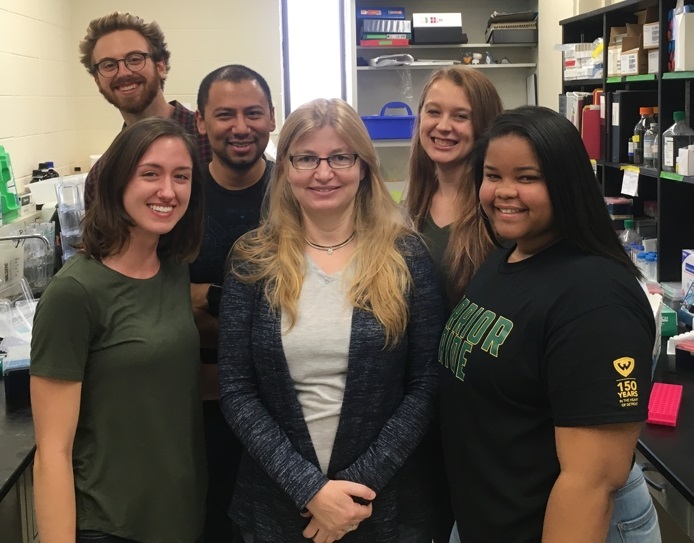
From left are Jacob Mackinder, Carly Martin, Fausto Varela, Karin List, Ph.D., Kimberley Sala-Hamrick and Victoria Foust.
The National Cancer Institute of the National Institutes of Health has awarded the Wayne State University School of Medicine a 5-year, $1.67 million grant (R01CA222359) through 2023 to support a project that may lead to new strategies for stopping breast cancer progression.
Associate Professor of Pharmacology and of Oncology Karin List, Ph.D., is the principal investigator on "Tumor-promoting functions of TMPRSS13 in Breast Cancer Progression."
The goal of the project is to examine the biological and molecular bases through which the cell-surface protease transmembrane protease, serine 13 - TMPRSS13 - contributes to breast cancer progression.
Her laboratory staff includes research assistant Jacob Mackinder, Cancer Biology Graduate Program student Carly Martin, doctoral student Fausto Varela, research assistant Kimberley Sala-Hamrick and biology student Victoria Foust.
"We anticipate that our comprehensive and novel studies will determine whether TMPRSS13 represents a novel target for therapy, and that the knowledge gained will be used to develop new strategies to halt breast cancer progression and prevent metastatic disease," Dr. List said.
"Breast cancer remains the second leading cause of cancer-related death among women in the United States, mainly due to the challenges in treating metastatic disease," she added. "Proteolytic enzymes have traditionally been viewed as culprits in cancer because of their ability to break down the extracellular matrix surrounding the tumor cells, allowing them to invade and spread to distant sites."
Recent studies have shown that pericellular proteases can also promote tumor progression by activating pro-oncogenic signaling pathways. Understanding the critical molecules involved in promoting primary tumor growth, invasion, and metastasis is pivotal for paving the way to developing effective treatment.
Dr. List acknowledges her collaborators on the grant, including WSU's Drs. Izabela Podgorski, Seongho Kim and Paul Stemmer, as well as Dr. Alfredo Molinolo of the University of California San Diego and Dr. Richard Leduc of the University of Sherbrooke, Quebec, Canada.